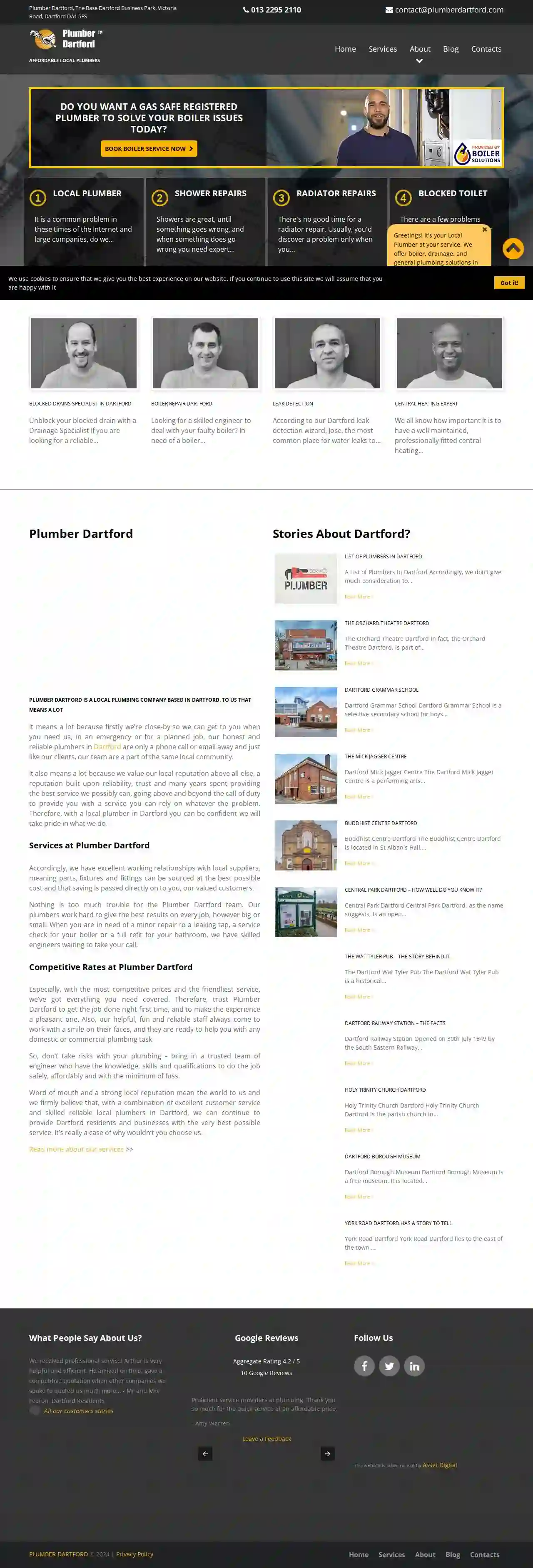AC Repair Dartford
Top Air Conditioner Repair in Dartford
Get up to 3 Air Conditioner Repair quotes for your project today! Compare profiles, reviews, accreditations, portfolio, etc... and choose the best service.
- Pr
Premier Heating Services Ltd, Boiler Services Dartford
530 reviewsDartford, GB- Services
- Why Us?
Get Quote 
PLUMBER DARTFORD
2.34 reviewsVictoria Road, The Base Dartford Business Park, Dartford, DA1 5FS, GBPlumber Dartford is a local plumbing company based in Dartford. We pride ourselves on being a reliable and trustworthy company, providing excellent service to our community. Our team of skilled plumbers are always ready to help with any plumbing issue, big or small. We work hard to ensure that our customers are satisfied with our work, and we offer competitive rates. We also have excellent relationships with local suppliers, which means we can source parts and fittings at the best possible prices. We understand that plumbing problems can be stressful, so we aim to provide a friendly and professional service that puts your mind at ease.
- Services
- Why Us?
- Accreditations
- Our Team
- Testimonials
Get Quote- Al
Allcool London Ltd
59 reviewsDartford, GB- Services
- Why Us?
Get Quote - Da
Dartford Plumbers
1Dartford, GB- Services
- Why Us?
Get Quote - Un
Universal Cooling South
52 reviewsDartford, GB- Services
- Why Us?
Get Quote - Sw
Swift Plumber Dartford
53 reviewsDartford, GB- Services
- Why Us?
Get Quote - Ai
AirisQ Ltd
51 reviewsDartford, GB- Services
- Why Us?
Get Quote - SP
SPEED AND STREET LIMITED
1Dartford, GB- Services
- Why Us?
Get Quote - TF
TF Solutions, Crayford
51 reviewsDartford, GB- Services
- Why Us?
Get Quote - Da
Dan Fee Heating Engineer
3.410 reviewsDartford, GB- Services
- Why Us?
Get Quote
Over 16,895+ HVAC Companies registered
Our HVAC pros operate in Dartford & beyond!
HVACCompaniesHub has curated and vetted Top HVAC Contractors arround Dartford. Find the most reliable contractor today.
Frequently Asked Questions About AC Repair
- Refrigerant Leaks: Low refrigerant levels reduce cooling capacity and can damage the compressor. Signs include warm air, ice on lines, and hissing sounds.
- Frozen Evaporator Coil: Restricted airflow (often from a dirty air filter) can cause ice to form on the coil, hindering cooling.
- Dirty Air Filters: A clogged filter restricts airflow, reducing efficiency and potentially causing other problems.
- Faulty Capacitor: The capacitor helps start the motor. A bad capacitor can prevent the AC from turning on or cause intermittent operation.
- Compressor Problems: The compressor is the heart of the system. Issues here are serious and often require professional repair or replacement. Look for unusual noises, reduced cooling, or frequent cycling.
- Thermostat Malfunctions: An inaccurate or unresponsive thermostat can lead to inefficient cooling or prevent the system from turning on/off properly.
- Clogged Condensate Drain Line: The drain line removes condensation. If blocked, it can cause water leaks or damage to the system.
- Regular maintenance: Schedule professional tune-ups at least once a year to optimize performance.
- Programmable thermostat: Automate temperature adjustments based on your schedule.
- Seal air leaks: Caulk and weatherstrip windows and doors to reduce air leakage.
- Proper insulation: Ensure adequate insulation to minimize heat transfer.
- Ventilation: Improve ventilation to remove excess heat and humidity.
- Energy-efficient appliances: Choose appliances with the Energy Star label to reduce overall energy load.
- HVAC zoning: Consider creating multiple zones to better regulate temperature different areas.
Can a dirty air filter cause my AC to freeze up?
What is a condenser coil, and what role does it play in my AC unit?
What are the most common AC problems?
How can I improve my AC's energy efficiency?
Can a dirty air filter cause my AC to freeze up?
What is a condenser coil, and what role does it play in my AC unit?
What are the most common AC problems?
- Refrigerant Leaks: Low refrigerant levels reduce cooling capacity and can damage the compressor. Signs include warm air, ice on lines, and hissing sounds.
- Frozen Evaporator Coil: Restricted airflow (often from a dirty air filter) can cause ice to form on the coil, hindering cooling.
- Dirty Air Filters: A clogged filter restricts airflow, reducing efficiency and potentially causing other problems.
- Faulty Capacitor: The capacitor helps start the motor. A bad capacitor can prevent the AC from turning on or cause intermittent operation.
- Compressor Problems: The compressor is the heart of the system. Issues here are serious and often require professional repair or replacement. Look for unusual noises, reduced cooling, or frequent cycling.
- Thermostat Malfunctions: An inaccurate or unresponsive thermostat can lead to inefficient cooling or prevent the system from turning on/off properly.
- Clogged Condensate Drain Line: The drain line removes condensation. If blocked, it can cause water leaks or damage to the system.
How can I improve my AC's energy efficiency?
- Regular maintenance: Schedule professional tune-ups annually to optimize performance.
- Programmable thermostat: Automate temperature adjustments based on your schedule.
- Seal air leaks: Caulk and weatherstrip windows and doors to reduce air leakage.
- Proper insulation: Ensure adequate attic, wall, and floor insulation to minimize heat transfer.
- Ventilation: Improve ventilation to remove excess heat and humidity.
- Energy-efficient appliances: Choose appliances with the Energy Star label to reduce overall energy load.
- HVAC zoning: Consider creating multiple zones to independently cool different areas.